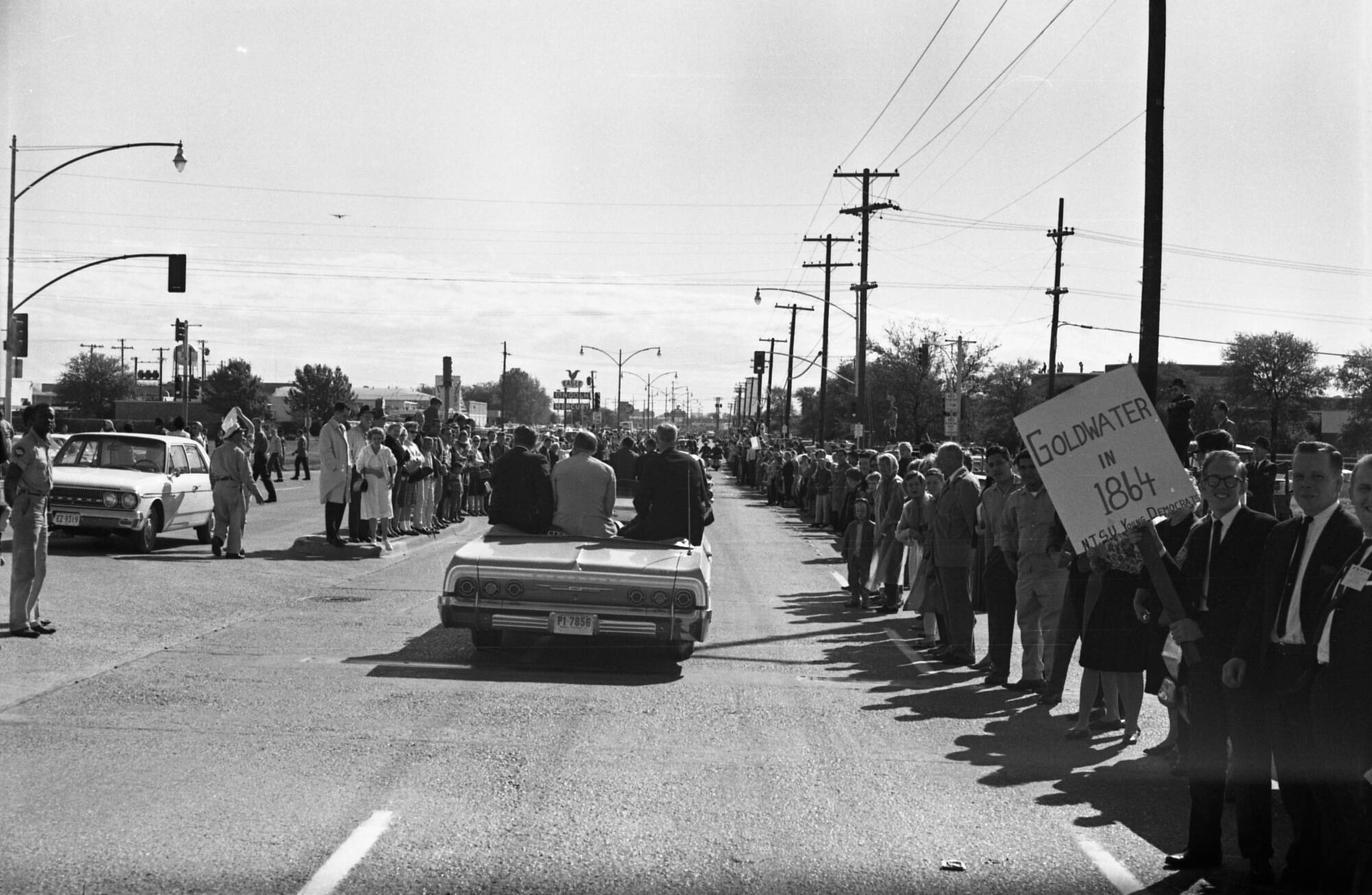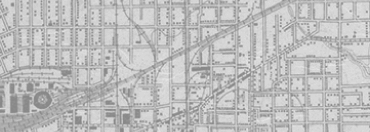


Back
Image of presidential motorcade on Lemmon Avenue
Original 35mm black and white negative taken by photographer Tom C. Dillard from The Dallas Morning News. The image shows the back of Camera Car #2 with a number of national news photographers as they rode in the presidential motorcade in Dallas, Texas on Friday, November 22, 1963. The image was taken as the motorcade drove down Lemmon Avenue. Dillard was in the front passenger seat of Camera Car #3 riding with fellow local news photographers. There are people lining both sides of the road holding signs and smiling as the motorcade passes.
Image of presidential motorcade on Lemmon Avenue
11/22/1963
Film
1 × 1 1/2 in. (2.5 × 3.8 cm)
Tom C. Dillard Collection, The Dallas Morning News/The Sixth Floor Museum at Dealey Plaza
1994.003.0001.0001
The handmade sign, "Goldwater in 1864," is a reference to the popular assumption that Republican Senator Barry Goldwater of Arizona would be the party's 1964 presidential nominee, challenging President Kennedy's re-election bid. The anti-Goldwater slogan, "Goldwater in 1864" (rather than 1964) appeared on campaign buttons and in editorial cartoons leading up to and during the 1964 presidential campaign. Goldwater was viewed by critics as a political reactionary who wanted to set the United States on a backward course rather than into the future. Looking back on that era, many people assume that John F. Kennedy was on an easy path to re-election, but in reality, Goldwater posed a significant threat by the fall of 1963. President Kennedy's position on civil rights made him newly vulnerable in the South. Victor Lasky's critical portrait, JFK: The Man and the Myth (1963), was a New York Times bestseller at a time when the president's approval rating dropped to an all-time low. Look Magazine even ran a feature article in 1963 entitled, "JFK Could Lose." However, the assassination all but sealed the political fate of Barry Goldwater. Regardless of who was accused of firing the shots that killed President Kennedy, the American far right came under a great deal of international criticism following President Kennedy's death for helping to create a toxic political environment, especially in an ultra-conservative city like Dallas. Sen. Goldwater's popularity dropped some sixteen points in the weeks following the assassination, and Lyndon Johnson won a decisive victory over Goldwater in 1964, capturing 486 electoral votes to Goldwater's 52. The "NTSU Young Democrats" at the bottom of the sign refers to North Texas State University in Denton, which is today known as the University of North Texas. -- Stephen Fagin, Curator

Image of presidential motorcade on Lemmon Avenue
Original 35mm black and white negative taken by photographer Tom C. Dillard from The Dallas Morning News. The image shows the back of Camera Car #2 with a number of national news photographers as they rode in the presidential motorcade in Dallas, Texas on Friday, November 22, 1963. The image was taken as the motorcade drove down Lemmon Avenue. Dillard was in the front passenger seat of Camera Car #3 riding with fellow local news photographers. There are people lining both sides of the road holding signs and smiling as the motorcade passes.
Image of presidential motorcade on Lemmon Avenue
11/22/1963
Crowds
Press
Reporter
Trip to Texas
Motorcade
Photographs
Sign
Dillard, Tom C.
The Dallas Morning News
Dallas
Film
1 × 1 1/2 in. (2.5 × 3.8 cm)
Tom C. Dillard Collection, The Dallas Morning News/The Sixth Floor Museum at Dealey Plaza
1994.003.0001.0001
The handmade sign, "Goldwater in 1864," is a reference to the popular assumption that Republican Senator Barry Goldwater of Arizona would be the party's 1964 presidential nominee, challenging President Kennedy's re-election bid. The anti-Goldwater slogan, "Goldwater in 1864" (rather than 1964) appeared on campaign buttons and in editorial cartoons leading up to and during the 1964 presidential campaign. Goldwater was viewed by critics as a political reactionary who wanted to set the United States on a backward course rather than into the future. Looking back on that era, many people assume that John F. Kennedy was on an easy path to re-election, but in reality, Goldwater posed a significant threat by the fall of 1963. President Kennedy's position on civil rights made him newly vulnerable in the South. Victor Lasky's critical portrait, JFK: The Man and the Myth (1963), was a New York Times bestseller at a time when the president's approval rating dropped to an all-time low. Look Magazine even ran a feature article in 1963 entitled, "JFK Could Lose." However, the assassination all but sealed the political fate of Barry Goldwater. Regardless of who was accused of firing the shots that killed President Kennedy, the American far right came under a great deal of international criticism following President Kennedy's death for helping to create a toxic political environment, especially in an ultra-conservative city like Dallas. Sen. Goldwater's popularity dropped some sixteen points in the weeks following the assassination, and Lyndon Johnson won a decisive victory over Goldwater in 1964, capturing 486 electoral votes to Goldwater's 52. The "NTSU Young Democrats" at the bottom of the sign refers to North Texas State University in Denton, which is today known as the University of North Texas. -- Stephen Fagin, Curator









